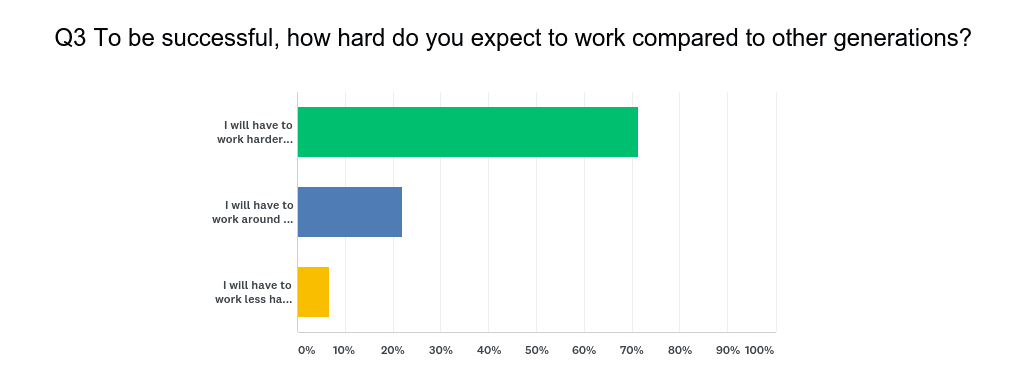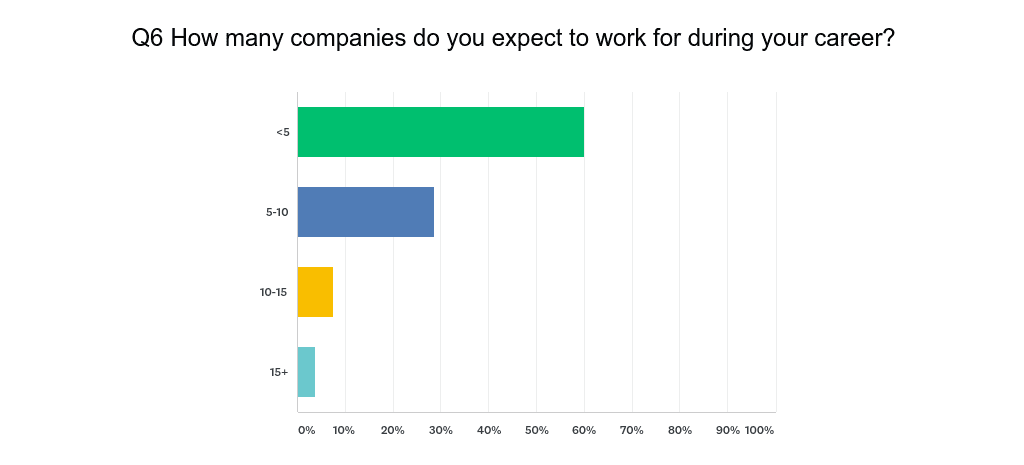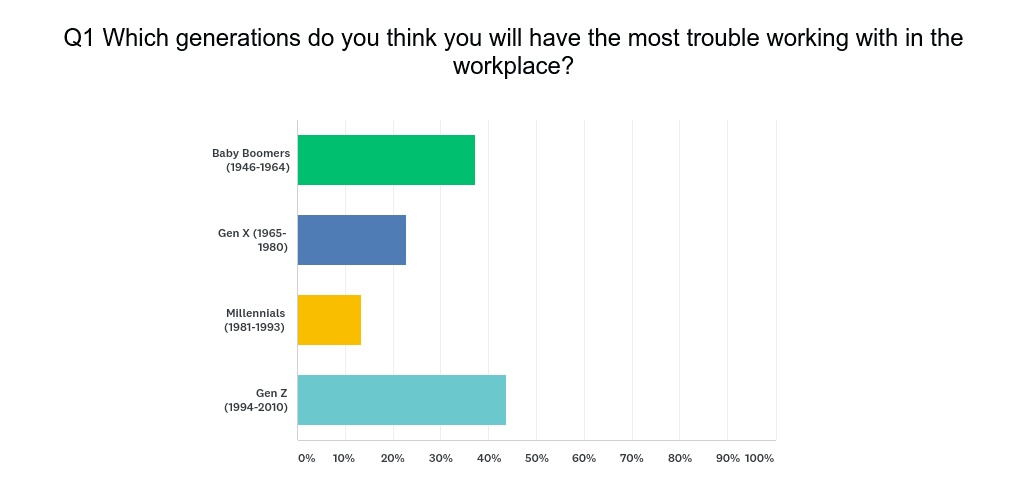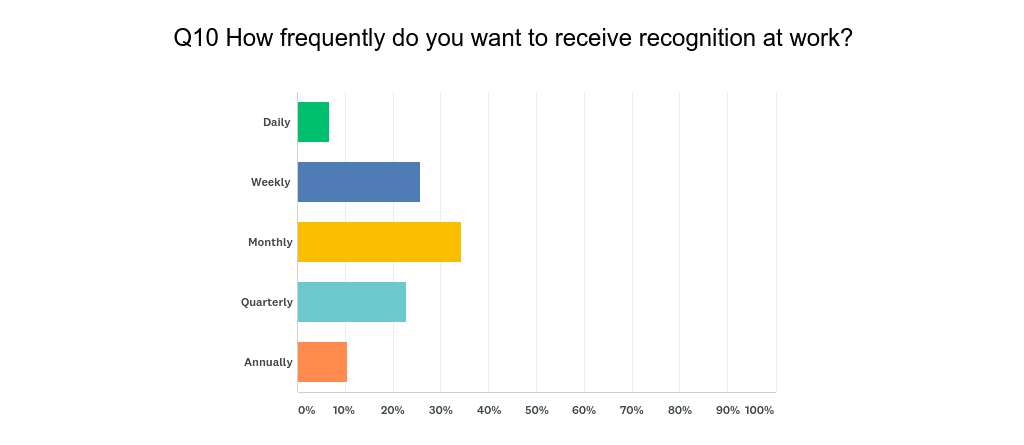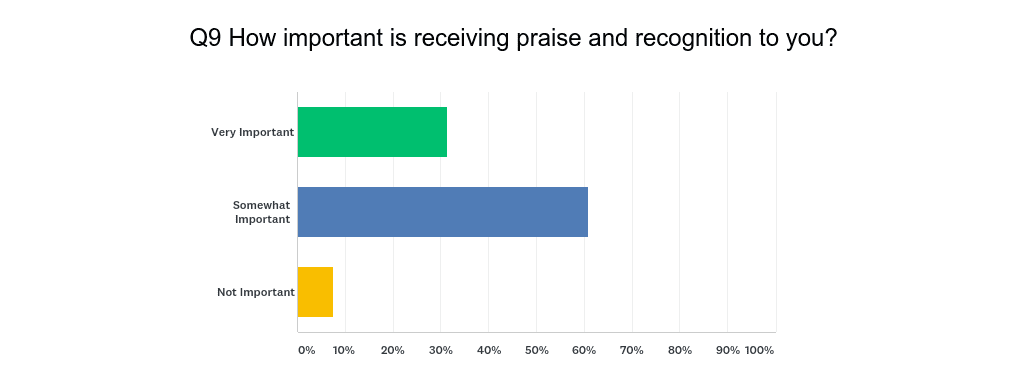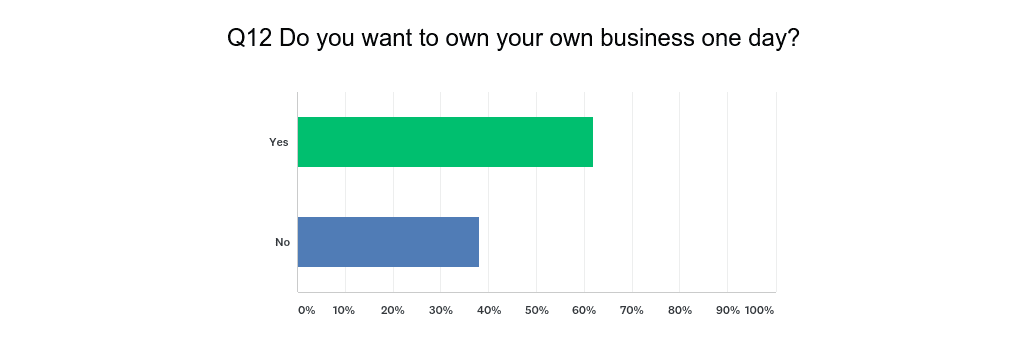
Compare Providers
Download our outplacement comparison sheet
Request Pricing
Compare our rates to other providers
For the last couple of years, Millennials and Baby Boomers have dominated the conversation about a multi-generational workforce. This is for good reason, too. Millennials are now the biggest working generation while many Baby Boomers are hitting retirement age and thinking about what to do when they step down from their current companies. But it’s time for us to focus on the next generation, a group known as Gen Z.
While there will likely still be countless headlines bemoaning the death of some outdated industry at the hands of Millennials and even more headlines about how Baby Boomers have caused problems for other generations to clean up, managers and business leaders – specifically – need to start looking at Gen Z.
Why?
Well, that’s simple: they’re entering the workforce at an alarming rate and if managers ignore this, their organizations will suffer. The conversation about Millennials took too long to get started and it left many companies unprepared. Let’s not make the same mistake again.
So, without further adieu, let’s get into what managers need to know about Gen Z to ensure that their organization is up to date and ready for an ever-changing workforce.
First Off, Who Exactly Is Gen Z?
With any talk of generations, many want to know the stats and figures. What years constitute the generation? How do we know we have a Gen Z member on our hands? And so on, and so on.
Well here it is: Gen Z constitutes people born in the mid-1990s to the mid-2000s. The exact date is hard to nail down because Gen Z is still so “new.” The most widely accepted date range is 1996 to 2006.
But does the date range really even matter? Not as much as you probably think.
While dates are a good way to distinguish generations – they are, after all, easy to remember – some claim that national events, usually tragedies, are a better way to remember them. For example, a common way to figure out if you are a Millennial or not is to ask yourself if you remember 9/11 but do not remember the Challenger disaster.
For Gen Z, many don’t remember 9/11 at all or – if they do – they were too young to grasp the event. They have, however, grown up in a chaotic world with many of them not remembering a time that the US wasn’t at war.
Still, regardless of what method you use to define Gen Z in dates or events, it still gets muddled and probably has a lot to do with personality than it does a specific, set-in-stone date range.
“Generational study being more art than science, there is considerable dispute about the definition of Generation Z. Demographers place its beginning anywhere from the early ’90s to the mid-2000s,” writes Alex Williams for The New York Times.
“Marketers and trend forecasters, however, who tend to slice generations into bite-size units, often characterize this group as a roughly 15-year bloc starting around 1996, making them 5 to 19 years old now. (By that definition, millennials were born between about 1980 and 1995, and are roughly 20 to 35 now.)”
The takeaway here should really be that Gen Z, no matter what date you put them at, are starting to enter the workforce more and more and they are different enough from the Millennials to be constituted as their own generation (more on this in a sec).
Okay, now that you have a better understanding of what age Gen Z-ers typically are, you can start to dig into what makes them tick and how you can manage them properly to ensure that your talent continues to develop into the future.
What Sets Gen Z Apart?
A cursory glance into Gen Z research reveals that many thinkers believe that Gen Z will become more Millennial Millennials.
For example, a report that looked into generational shifts by 747 Insights, a boutique research firm, describes Gen Z as “Millennials on steroids.”
“In many ways, generational change is like the seasons,” Michael Wood, a principal researcher at 747 Insights, told Business Insider.
“The changes are very gradual, and if we’re looking at society as a whole, it’s this Millennial mindset that has influenced Gen X and the older generations, but also definitely has had a strong influence on Gen Z.”
That can be true to an extent. After all, Millennials and Gen Zs aren’t separated by too many years and it stands to reason that Millennials have influenced Gen Z quite a bit, but to just chalk up Gen Z as a more Millennial version of Millennials is false.
For instance, Millennials have adopted technology while Gen Z has grown up with it readily available. When most Millennials were born, PCs and cell phones were starting to enter homes across the world. However, there was a time for many Millennials when their families didn’t have cell phones, or didn’t have a computer, or had a computer but it was located in a family room that the whole household used and shared. For Gen Z, they are what many people call “digitally native,” meaning that they grew up in a world where having a phone, tablet, and a computer was the norm from the start. A computer that is all their own, one that they can’t – for the most part – see life without.
Of course, as with any talk of generations, some even claim that this is false, too. A recent report published in Teaching and Teacher Education claims that the term ‘digital native’ is actually a myth and is used to mainly to change education policy.
“The digital native is a myth, [the study] claims: a yeti with a smartphone,” writes the editors of Nature.
“Many schools and universities are retooling to cope with kids and young adults who are supposedly different. From collaborative learning in the classroom to the provision of e-learning modules in undergraduate courses, the rise of the digital native is being used as a reason — some say a justification — for significant policy changes.”
The study goes on to suggest that the myth of the digital native is used in an attempt to predict what generations want. For the study, they mentioned that many believe Millennials are digital natives, too, which is a hotly contested statement in itself and – from all of the available data – false.
So, in other words, all of the talk surrounding how Gen Z’s use of technology might be false mainly because the people coming up with these terms are not members of the generation and typically have their own agenda (policy, marketing, etc).
If we really want to get to the bottom of things, we should, honestly, just ask them how they want to use technology instead of having people try to predict their wants and needs. After all, Gen Z isn’t Bigfoot, they aren’t hard to track down. If they were, there’d be no need for this article.
Guess what?
We did just that. According to a survey we sent out to 100 different Gen Z members, they have a unique outlook on technology. While Millennials favor the use of technology over face-to-face communication, Gen Z is the opposite. They like tech and know that it’s a part of life but they also know that getting things done in front of each other is probably the best way to do business.
And that’s just one way that Gen Z and Millennials are differing on work, tech, and communication.
What this section boils down to is that yes, Gen Z has a lot in common with the Millennial generation, though they are quite different, too. And no one has yet to come up with a great overview of the generation like we have with Millennials, Gen X, and Baby Boomers.
Gen Z is so new that we cannot possibly know everything about them and to think we can at this stage is naive. Instead, we should focus on what they tell us they want, specifically how they want to work so we can integrate them into the modern workforce to make sure that they – and the generations that are currently working – can thrive and grow together.
And with that, let’s take a look at the workplace, what our survey found, and what the available research has to say about preparing our businesses for a wave of Gen Z-ers.
How Do Gen Zs Like to Work?
Instead of relying on hypotheticals, we reached out to a group of Gen Z members to see how they want to work in the future and what is the most appealing to them.
And we found some pretty interesting responses.
For example, Gen Z loves technology (as most younger generations do) and they want to harness technology to work in various ways.
Mostly, our survey found that many Gen Z members would rather work from home than in an office. If they were to work in an office setting, they’d prefer to have a cubicle or office where their own personal space is defined. This goes against the Millennial trend of open, collaborative workspaces where officers are all mingled together.
What’s funny is that even though Gen Z wants to have their own space and would really love to work from the comfort of their own homes, they also prefer face-to-face communication more than Millennials who – overall – prefer things like Slack, email, and phone calls.
Gen Z also reported that they feel like they will have the most trouble working with themselves than with other generations, which is way different than Millennials who typically clash with Baby Boomers.
We’ll get into how these reports will play out in the workplace in a bit, but what’s important is to understand that Gen Z and Millennials are different when it comes to way they want to work. So, if you’ve set up your office to attract and retain Millennial talent – which you should have because Millennials are the biggest working generation – you might need take into account how Gen Z will want to work, too.
You can do this by offering flexibility in your workplace, allowing people to work in various ways as long as they get their work done.
Besides understanding how Gen Z likes to work, it’s also important to know what the generation wants out of their careers and what they care about in general, too, which brings us to our next point:
What Do Gen Z Members Expect From the Workforce?
This is a tough questions, especially because so many have tried to pin down how Gen Z will operate inside the already crowded workplace. Will they be lazy? Will they get along with other generations? Do they expect to work for one organization for a long time or jump around from organization to organization?
There are tons of myths out there trying to answer these questions. Again, however, we went straight to the source to see exactly what Gen Z expects and wants throughout their careers.
Let’s start with the myth that Gen Z will be a lazy generation.
“Though they’re characterized as multi-tasking whizzes, they’re simultaneously garnering the reputation among older generations of being lazy, unaware and apathetic,” reports Julianne Micoleta from The Huffington Post in an article about the stereotypes thrown around about Gen Z.
“Gen Z is often portrayed as less engaged in politics; they have short attention spans and don’t care about the weighty issues that confront their generation and the nation; and they’re more interested in technology and celebrity than staying active in their communities and schools.”
Basically, older generations seem to think that because Gen Z is so attached and entwined with technology that they have to be lazier than other generations for various reasons. This, like many opinions about Gen Z, is wrong.
In our poll, we found that Gen Z members expect to work harder than the generations before them.
While the reason for this isn’t fully understood, we can take a few guesses based on the fact that wages haven’t really increased for a number of years while housing costs have soared. Couple that with the insane cost of education and you can see how Gen Z is expecting to work really hard to get to a place of stability where they will be able to buy a house, start a family, and potentially retire one day.
We also found that Gen Z expects to work for more than five companies during their careers. This is something that Gen Z and Millennials actually have in common. It seems that job hopping is the new norm for various reasons, mainly because it’s harder to move up in the same organization than it is to find a new, better paying and more engaging role elsewhere.
Whatever the reasons, Gen Z clearly knows that they will need to continue working hard by jumping jobs and finding new opportunities more than any generation before them. And that’s the opposite of laziness. It sounds downright stressful.
It’s also important to note that these opinions might change when Gen Z fully incorporates into the workforce. For example, Millennials have long been touted as “fair weather employees” who jump from job to job seemingly on a whim. This, however, has been found to be common among multiple generations – not just Millennials.
“Okay — who started the rumors that millennials are opportunistic, fair-weather employees just biding their time until they “trade up” to the next gig?” askes Sarah Landrum from Forbes.
“Because, wonder of wonders, it doesn’t seem to hold up against the facts any longer. Thanks to data on job retention furnished every two years by the U.S. Department of Labor, we can compare retention between millennials and Gen Xers when they were both the same age.”
The report found that Gen X and Millennials stayed with companies for 13 months on average, showing that job hopping isn’t just a younger generation thing. Will Gen Z also fall into this, though? Will they bring something new or follow what Gen X has started? We’ll have to see, but it’s important to look at the previous generations to make sure we aren’t blowing anything out of proportion.
How Will Gen Z Get Along Inside the Workforce?
The next important thing to consider is how Gen Z will work with others inside the office and what managers should expect to deal with.
One of the top myths about Gen Z is that they will end up not being able to work with other generations.
While on the surface this makes a lot of sense because they grew up in a totally different time than Baby Boomers and a very, very different time compared to The Silent Generation. As we’ve mentioned numerous times, there are a lot of differences between them an Millennials, too, which all seems to point to the idea that they will have difficulties working with older generations.
This, again, is just not true. In our survey, we found that Gen Z members think that they will have more problems working with members of their generation. Why? It might all go back to their expectation of having to work really hard and competitively to get ahead. It makes sense that if they feel like they must work super hard to get ahead, they will likely have to battle it out with people their same age.
Getting along with coworkers and being able to work collaboratively are a lot different than how they will get along with their bosses, though.
In our survey, we found that Gen Z will mostly look for honest managers who are more willing to openly discuss things with them instead of lying or sugar coating issues. The next biggest factor is intelligence, which aligns with Gen Z’s passion for increasing their knowledge base. (We’ll touch more on that later.)
“They also have a higher expectation of relationship with their bosses. Even though they are fluent in a world of social media, text messages and email, they would much rather have genuine conversations and connections with higher-ups,” reports John Boitnott from Inc.
“Additionally, this generation is very project-oriented, ready to run with whatever is given to them. However, they prefer extensive feedback and input from those higher than them. Both of these mean that your company’s managers should be making every effort to connect with your gen Z employees and supporting them in whatever endeavors they are pursuing for the company.”
Basically, Gen Z is willing and ready to dive into various projects, but they want their managers to give them true, honest feedback about what they can do better, what they’re doing right, and everything in between.
In the poll, we found that Gen Z-ers want expect to get feedback about once per month, which is true of a lot of the modern workforce because – in the past – companies have done reviews on an annual or semi-annual basis. This old-school way of reviewing is now frowned upon because people want to know what they’re doing right and wrong before it is too late to change it.
If an employee is unable to tell what is and what isn’t working, their performance suffers, which Gen Z and just about every other generation working right now doesn’t want.
Gen Z-ers also reported that recognition and praise is only somewhat important to them, which goes against a common misconception that younger generations have to be coddled and praised nearly every afternoon to retain them.
Speaking of Gen Z retention, what motivates them and what will keep them thriving?
What Motivates Gen Z?
It’s said that Gen Z will soon be one-fifth of the workforce. That’s a ton of people. So how do you motivate them and attract them?
Well, to figure that out, we should probably look at what Gen Z aims to accomplish over the course of their careers and what means the most to them in the workforce at large.
Let’s start with the first question: what does Gen Z want out of their careers?
According to our research, most members of Gen Z are highly entrepreneurial and want to one day have their own businesses or reach the executive level of a pre-existing one.
Specifically, nearly 70 percent of those that responded to our poll said that they want to become an executive leader while slightly over 60 percent want to own their own businesses. Not only is this not lazy, a myth that we covered above, it proves that Gen Z has high ambitions and hopes for their future and are expecting to work harder to get there.
Unlike many other aspects of Gen Z, this ambition is highly noted in many articles online.
“Generation Z is 55 percent more likely to want to start a business than millennials,” states Deep Patel from Fobes.
“In fact, a full 72 percent of Gen Z high school students say that they want to start a business. This can be tied back to many of their traits — especially the independence and desire for financial success. They are highly motivated and willing to work hard to achieve their dreams.”
The odd thing is that these entrepreneurial leanings are causing more and more Gen Z-ers to actually skip college to pursue their dreams.
“In a new study called “High School Careers“, by my company and Internships.com, we surveyed 4,769 students, which includes 172 high school students and 4,597 college students. In our research, we discovered that 72 percent of high school students and 64 percent of college students want to start a business someday,” reports Dan Schawbel, from Millennial Branding, in an article for Entrepreneur.
“In addition, 61 percent of high school students and 43 percent of college students would rather be an entrepreneur instead of an employee when they graduate college. While Gen Y struggles to pay back one trillion dollars in student loans, and is living with their parents when they graduate, Gen Z is already focused on creating their own companies and living life on their terms.”
In other words, Gen Z has watched Millennials accrue massive amounts of debt with no way to pay it back and no way to even clear it with bankruptcy. They’ve taken these insights and have come to a seemingly logical conclusion: why take on so much debt and then be beholden to companies to pay the loans? Why not just try to make something yourself and, maybe, go back to school later?
And, according to what we’ve found, those that do go a more traditional route want to lead businesses one day, too.
Besides what level of success Gen Z wants out of their careers, they also hold diversity issues highly and expect workplaces to reflect those ideals.
Okay, we’ve covered a ton of information about Gen Z and how they will fit into your workforce. Now, the question is: what can you do to retain Gen Z and should you even care right now?
Let’s start with the latter.
Should You Cater to Gen Z?
Like Millennials, Gen Z is coming into the workforce with expectations. Given that they expect to job-hop throughout their career, it stands to reason that they will be ready and willing to leave organizations that do not line up with their wants and needs.
So, should your organization care? After all, Gen Z is only one tiny speck of a multi-generational workforce, right?
The answer is a resounding yes, you should care a lot. It is expected that Gen Z will take up about a fifth of the workforce within only the next couple of years. That’s a whole lot of people, and business owners need to get ready for it.
Still, though, it’s important to note that yes, they will be one-fifth of the workforce shortly, however, there is still a remaining four-fifths of the workforce that you cannot alienate in the process.
Right now, the workforce has a whopping five generations working inside it. While most of The Silent Generation has retired – with the exception of a few – Baby Boomers are still thriving in the workforce with many refusing to retire for either financial or social reasons.
Even with reluctant retirees on the rise, Baby Boomers are starting to make a mass exit from the workforce, meaning that the development of Gen X, Millennials, and Gen Z is vital if an organization wants to thrive into the future.
This all boils down to future-proofing your organization. Following the wants of the younger generations will – most likely – set your company up for future success in many areas because these generations will not only be the leaders of the future, they also have their fingers on the pulse of what new customers and the world wants from businesses in general.
Dan Schawbel, in an article for Forbes, describes this aptly while talking about Millennials:
“Technology has ended the nine to five workday, crushed global communication barriers and create transparent offices. They have forced companies to rethink flexibility, meetings and cubicles. They also believe that businesses should focus on a societal purpose, not just be in business to make a profit. This is why you see so many millennial become social entrepreneurs or support their local non-profit – they always need to feel like they are touching someone and making an impact, regardless of their job title.”
What’s that mean then? How are you supposed to navigate this?
Know What Gen Z Wants and See If There’s a Fit
The cool and easy thing about Gen Z is that – just like Millennials – they pretty much align with the way business is changing as a whole. As Schawbel notes, flexible work schedules – specifically work-from-home arrangements – an increased level of technological know-how, a want and care for diversity issues, and a passion for making work easier instead of harder is where the entire workforce is headed.
Gen Z, and their Millennial counterparts, will just get there faster, which is good for your business no matter what generation you personally belong to.
So, if we were to wrap all of this up. Here are a few things that your organization should pay special care to if you want to engage, retain, and attract Gen Z talent:
- Value face-to-face communication
- Implement work-life balance policies
- Include flexible working arrangements (work-from-home)
- Value diversity
- Be forward thinking
- Implement self-learning programs for continued development
- Be honest and forthcoming with feedback
If you follow these simple steps, your organization will be able to march forward into the future knowing that Gen Z, Millennials, and whatever will come next will have a place to thrive. Not only is this good for new workers coming into the workforce, but for your bottom line, too.
Want to learn more about how Careerminds can help you? Why not schedule a demo?
In need of outplacement assistance?
At Careerminds, we care about people first. That’s why we offer personalized talent management solutions for every level at lower costs, globally.


